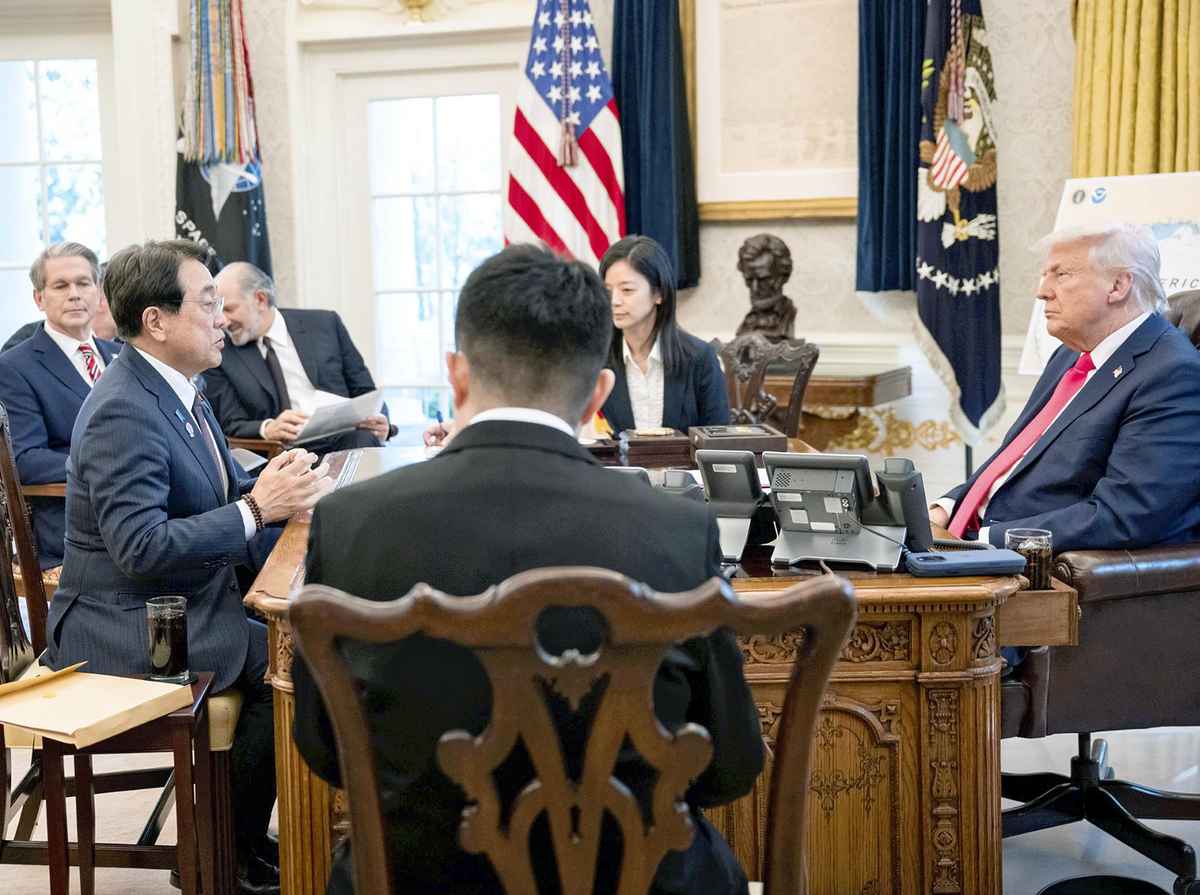U.S. Talks About Car, Rice Exports During Meetings with Akazawa; Trump Mentions Japan’s Defense Burden, Ministers Don’t

Economic revitalization minister Ryosei Akazawa, left, and U.S. President Donald Trump
16:30 JST, April 19, 2025
In the recent meeting held at the White House between economic revitalization minister Ryosei Akazawa and U.S. President Donald Trump over U.S. tariff measures, it became clear that Trump considers the current situation surrounding car exports and defense burden-sharing with Japan to be problematic.
Meanwhile, a subsequent meeting with U.S. Treasury Secretary Scott Bessent and other officials showed their interest in the topic of rice exports to Japan.
The government intends to consider measures to address these concerns in order to conclude the negotiations on the new U.S. tariffs.
When Akazawa entered the Oval Office on Wednesday evening, he found himself being ushered into the chair right in front of Trump’s desk for a face-to-face meeting with the U.S. president. His original negotiating partners, namely Bessent, U.S. Trade Representative (USTR) Jamieson Greer and Commerce Secretary Howard Lutnick, intently watched the conversation between Akazawa and Trump on the sidelines.
Trump spouted off, saying that the U.S. trade deficit with Japan is as high as $120 billion (about ¥17 trillion) and that not a single U.S. car is running on Japan’s roads. He went on to complain that the United States is defending Japan, but Japan is not bearing any of the burden.
The U.S. trade deficit with Japan is actually $68.5 billion as of 2024.
Understanding that Trump tends to exaggerate everything while not paying attention to the facts and tries to negotiate to his advantage, Akazawa tried his best to speak with a cool head.
Akazawa stressed that Japanese companies have been contributing greatly to job creation in the United States through investment and that Japan does not discriminate against U.S. cars.
He also explained that Japan’s share of the cost of hosting U.S. troops in the country, in what is dubbed the “sympathy budget,” is over ¥1 trillion for the period from fiscal 2022 to fiscal 2026.
At a ministerial-level meeting held afterward at a different location, Bessent, Greer, and Lutnick said that U.S. motor vehicle safety standards were not being treated as at the same level as Japan’s. They were also critical of Japan’s system of importation and distribution of rice for being highly regulated and nontransparent and called for the country to import more meat, seafood and potatoes.
As these topics had already been touched on in the USTR report on foreign trade barriers, the Japanese side were already aware of them.
However, Bessent and other officials did not specify in advance what they would prioritize in the talks and refrained from evaluating the Japanese proposal to increase its imports of agricultural products. Akazawa has reportedly asked them to clarify what issues they are prioritizing.
Prime Minister Shigeru Ishiba intends to soften the U.S. position with more specific proposals, with increases to the imports of U.S. rice and soybeans being considered as one bargaining chip.
China was the destination of 54% of U.S. soybean exports in 2023. With the imposition of high retaliatory tariffs between the two countries, Japan intends to partially make up for the drop in China’s imports of them.
In the area of automobiles, the government intends to find ways to ease the certification system for vehicles of overseas makers.
Bessent and the other U.S. negotiators did not make reference to Japan’s share of the defense burden during the meeting. Therefore, the issue is not expected to be a major topic of the tariff negotiations. However, the prevailing view within the Japanese government is that: “Now that Trump has mentioned it, we have no option but to include some measures.”
Ishiba is considering a visit to the United States in order to reach an agreement with Trump before the House of Councillors elections in the summer.
The Japan-U.S. tariff negotiations are among the first bilateral talks related to the tariff measures and are thus other countries are paying close attention to them. Both sides are expected to put their cards on the table in the second round of the talks, which could be conducted before the end of the month.
Top Articles in Politics
-

Japan PM Takaichi’s Cabinet Resigns en Masse
-

Sanae Takaichi Elected Prime Minister of Japan; Keeps All Cabinet Appointees from Previous Term
-

Japan’s Govt to Submit Road Map for Growth Strategy in March, PM Takaichi to Announce in Upcoming Policy Speech
-

LDP Wins Historic Landslide Victory
-

LDP Wins Landslide Victory, Secures Single-party Majority; Ruling Coalition with JIP Poised to Secure Over 300 seats (UPDATE 1)
JN ACCESS RANKING
-

Producer Behind Pop Group XG Arrested for Cocaine Possession
-

Japan PM Takaichi’s Cabinet Resigns en Masse
-

Man Infected with Measles Reportedly Dined at Restaurant in Tokyo Station
-

Israeli Ambassador to Japan Speaks about Japan’s Role in the Reconstruction of Gaza
-

Videos Plagiarized, Reposted with False Subtitles Claiming ‘Ryukyu Belongs to China’; Anti-China False Information Also Posted in Japan























